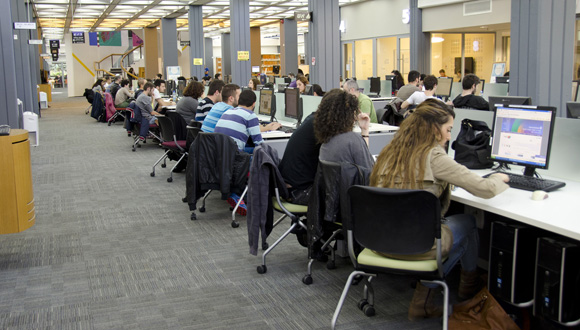Care for A Glass of Tel Aviv Air?
TAU study shows atmospheric water vapor in the city is suitable for drinking.
The best things in life are allegedly free, and a first-of-its-kind study in the world conducted at Tel Aviv University supports this belief. Researchers have found that nature’s very own champagne, generated from the air in the heart of an urban area, the city of Tel Aviv, complies with all of the strict drinking water standards set both by the State of Israel and by the World Health Organization. Have we finally found a solution to the global drinking water scarcity?
Like the Air that We Breathe
The constantly growing global shortage of clean drinking water requires thinking outside the box – and developing new technologies for producing potable water. The Earth’s atmosphere is a vast and renewable source of water, which may be an alternative drinking water resource. Our atmosphere contains billions of tons of water, 98% of which is in a gaseous state – that is, water vapor.
The study was conducted by a team of experts from the hydrochemistry laboratory at the Porter School of the Environment and Earth Sciences at Tel Aviv University, led by graduate student Offir Inbar and supervised by Prof. Dror Avisar, Head of TAU’s Moshe Mirilashvili Institute for Applied Water Studies. Also participating in the study was Watergen’s research and development team, Prof. Alexandra Chudnovsky, and leading researchers from Germany. The study’s results were published in two leading journals: Science of the Total Environment and Water.
Wind Flavored Water
Offir Inbar explains that this is the first study in the world to examine air pollution through its effect on drinking water generated from the air. No filtration or treatment system was installed in the device used in the study; the water that was produced was the water that was obtained from the air. The researchers performed a wide range of advanced chemical analyses of the water, and found that in the vast majority of cases, including during different seasons and at different times of the day, the water extracted from the air in the heart of Tel Aviv was safe to drink. In addition, with the help of a variety of innovative technologies for monitoring the composition of the atmosphere and by applying advanced statistical methods, for the first time the researchers were able to quantitatively link the process the air goes through in the days leading up to the point of water production and the chemical composition of the dew.

Tel Aviv – a source of clean drinking water?
Offir Inbar explains: “The study showed that wind direction greatly affects water quality. When the wind comes from the desert, we find more calcium and sulfur – residues of desert dust aerosols – in the water. When the wind comes from the direction of the sea, we find higher concentrations of chlorine and sodium. We also found that the distant sources of the air, prior to when it reached the point of water production, can be identified in the water. Thus, water produced from air coming from the Sahara region differs in composition from water produced from air coming from Europe.”
Water quality is also affected by anthropogenic pollution from transportation and industry. “Using advanced methods, we found a direct link between the concentrations of ammonia, nitrogen oxides and sulfur dioxide in the air and the concentration of their decomposition products in water,” says Inbar. “We found low concentrations of copper, potassium, and zinc in the water, which probably come from manmade pollution.
Minerals Should be Added
The chemical link we found between the meteorological parameters and the composition of the water makes it possible for the first time to study the atmosphere using water extracted from it. This link allows us to know what minerals should be added to water extracted from air in order to provide people with quality drinking water. In general, we found that potable water from air does not contain enough calcium and magnesium – and it is advisable to add these minerals to the water, just like they are added to desalinated drinking water in some countries.”
A significant portion of the water we drink in Israel today is desalinated seawater – a solution which Inbar says is only a partial solution, and not one that can provide drinking water to the vast majority of the world’s population. “In order to desalinate seawater, you need a sea. The sea, however, is not accessible from every place in the world,” says Inbar. “After desalination, a complete infrastructure must be built to carry the desalinated water from the waterfront to the various towns, and large parts of the world don’t possess the engineering and economic means for that. Water from the air can be produced anywhere, with no need for expensive transport infrastructure and regardless of the amount of precipitation. From an economic perspective, the higher the temperature and humidity, the more cost-effective the production of water from the air is.”
Devices for generating water from the air that include water purification and treatment systems are already in use in a lot of countries, and provide quality drinking water to people living in distressed areas. “The concern in this case was that water produced from air in the heart of an urban area would not be suitable for drinking. We have proved that this is not the case,” Inbar concludes. “We are currently expanding our research to other areas in Israel, including the Haifa Bay and agricultural areas, in order to investigate in depth, the impact of various pollutants on the quality of water extracted from the air.”
Featured image:Offir Inbar enjoys a glass of Tel Aviv atmosphere derived water in the lab



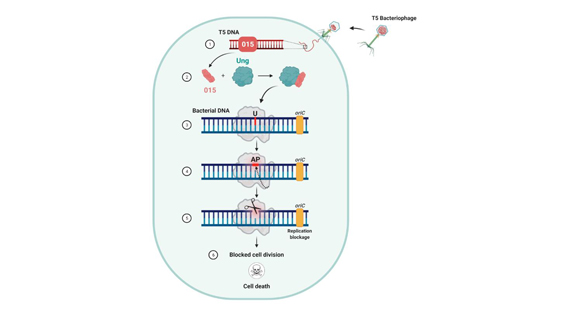 The process by which the bacteriophage destroys the bacteria’s genetic material
Prof. Qimron explains that, “The ability to distinguish between oneself and others is of enormous importance in nature and in various biological applications. All antibiotic mechanisms identify and neutralize bacteria only, with minimal effect on human cells.”
The researchers discovered the process by searching for types of bacterial variants not impacted by this bacteriophage mechanism – those that have developed “immunity” to it. This inquiry led them to the specific bacterial mechanisms affected by the bacteriophage takeover. “Shedding more light on the ways in which bacteriophages attack bacteria, our findings may serve as a tool in the endless battle against antibiotic-resistant bacteria,” concludes Prof. Qimron.
Featured image: Illustrative: Bacteriophage or phage virus attacking and infecting a bacterium
The process by which the bacteriophage destroys the bacteria’s genetic material
Prof. Qimron explains that, “The ability to distinguish between oneself and others is of enormous importance in nature and in various biological applications. All antibiotic mechanisms identify and neutralize bacteria only, with minimal effect on human cells.”
The researchers discovered the process by searching for types of bacterial variants not impacted by this bacteriophage mechanism – those that have developed “immunity” to it. This inquiry led them to the specific bacterial mechanisms affected by the bacteriophage takeover. “Shedding more light on the ways in which bacteriophages attack bacteria, our findings may serve as a tool in the endless battle against antibiotic-resistant bacteria,” concludes Prof. Qimron.
Featured image: Illustrative: Bacteriophage or phage virus attacking and infecting a bacterium


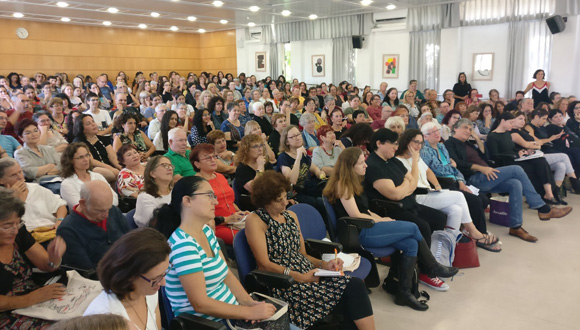 A conference hosted by the NCJW Women and Gender Studies Program (Photo: Tanya Gurov)
The Program’s influence is evident in its impact on the lives of its students. For instance, it has provided Ph.D. researcher and lecturer
A conference hosted by the NCJW Women and Gender Studies Program (Photo: Tanya Gurov)
The Program’s influence is evident in its impact on the lives of its students. For instance, it has provided Ph.D. researcher and lecturer 

 Prof. Amir Globerson (Photo: Moshe Bedarshi)
Prof. Amir Globerson (Photo: Moshe Bedarshi)
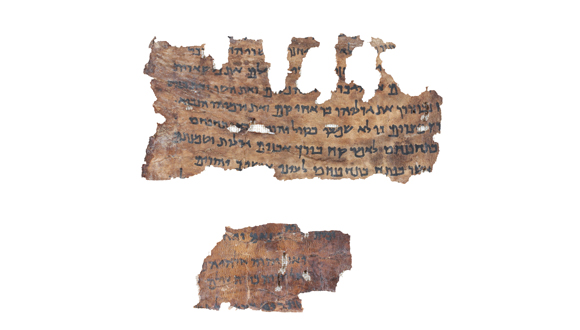 Dead Sea scrolls (Photo: Shai Halevi)
Dead Sea scrolls (Photo: Shai Halevi)
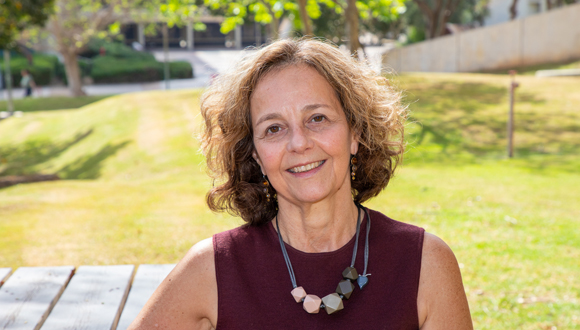 Prof. Niva Elkin-Koren (Photo: Moshe Bedarshi)
Shomron says the same is true in his field of medicine; as society evolves, he says, TAU researchers must continue to study and find ways to respond to emerging challenges. “Our world is changing all the time so we’re always looking at the next frontier,” he says. “That is what we do in academia: We try to invent the future.”
By Judith Sudilovsky
Featured image: Prof. Noam Shomron (right) discusses test results with MDPhD candidate Yazeed Zoabi (left) and doctoral candidate Meitar Grad in his medical genomics lab. (Photo: Yoram Reshef)
Prof. Niva Elkin-Koren (Photo: Moshe Bedarshi)
Shomron says the same is true in his field of medicine; as society evolves, he says, TAU researchers must continue to study and find ways to respond to emerging challenges. “Our world is changing all the time so we’re always looking at the next frontier,” he says. “That is what we do in academia: We try to invent the future.”
By Judith Sudilovsky
Featured image: Prof. Noam Shomron (right) discusses test results with MDPhD candidate Yazeed Zoabi (left) and doctoral candidate Meitar Grad in his medical genomics lab. (Photo: Yoram Reshef)

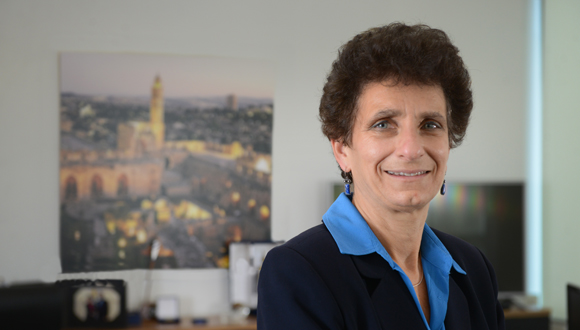 Galit Ronen (Photo: DEF)
Galit Ronen (Photo: DEF)
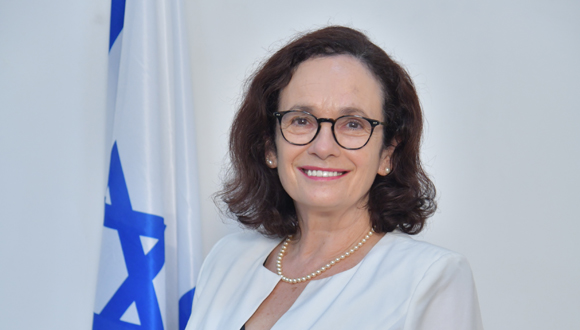 Rony Yedidia-Clein
Rony Yedidia-Clein
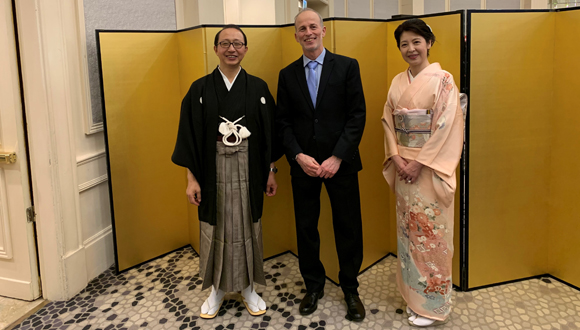
Ehud Eitam with the Japanese Consul and his wife
By Melanie Takefman
Featured image: Rony Yedidia-Clein (center, in white) in Rishikesh, during the Indian holiday of Holi.
Ehud Eitam with the Japanese Consul and his wife
By Melanie Takefman
Featured image: Rony Yedidia-Clein (center, in white) in Rishikesh, during the Indian holiday of Holi.

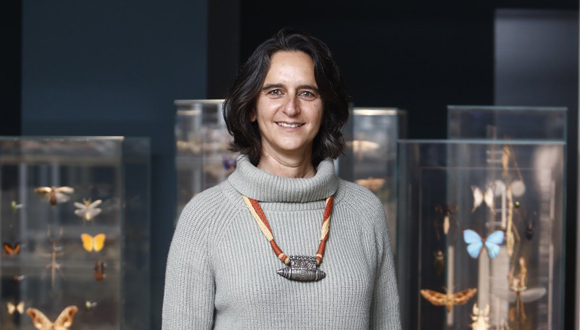 Prof. Noga Kronfeld-Shor used the platform to call for action (photo: Yael Tzur)
Prof. Noga Kronfeld-Shor used the platform to call for action (photo: Yael Tzur)
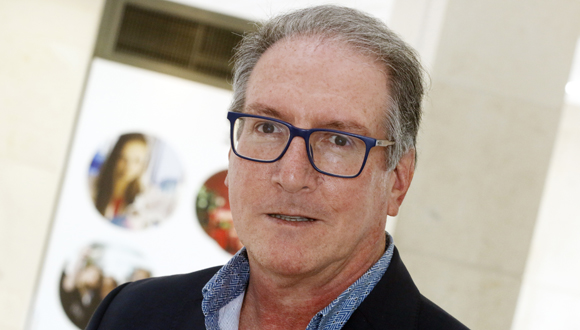 Head of the Climate Center Prof. Colin Price gave the closing remarks at the event (photo: Noam Wind)
Head of the Climate Center Prof. Colin Price gave the closing remarks at the event (photo: Noam Wind)


